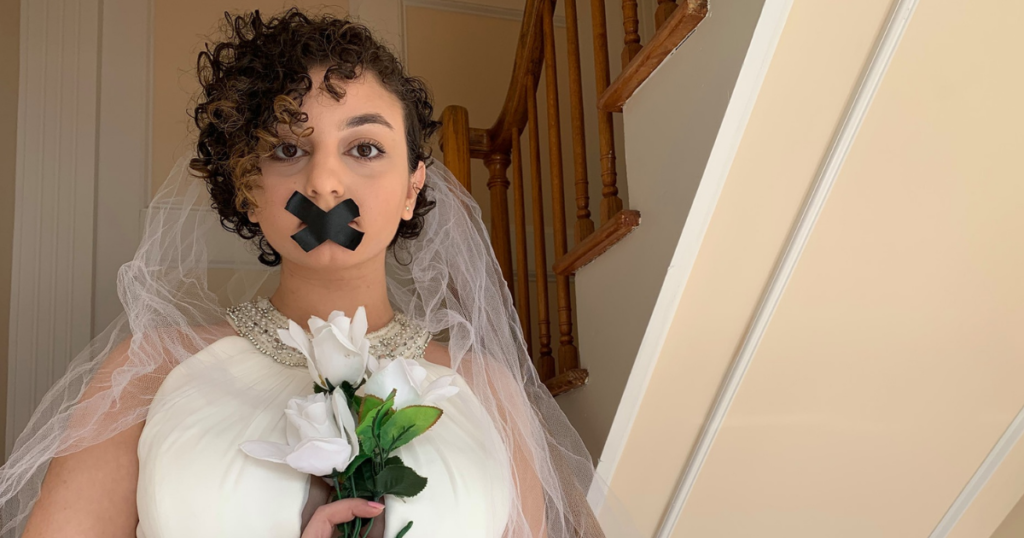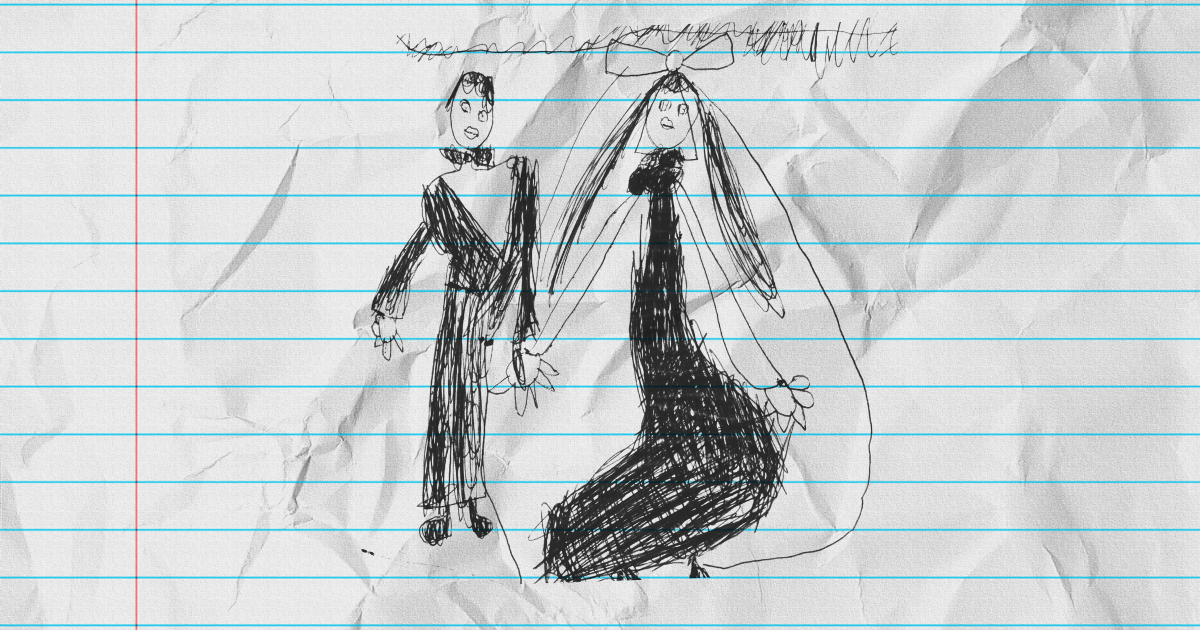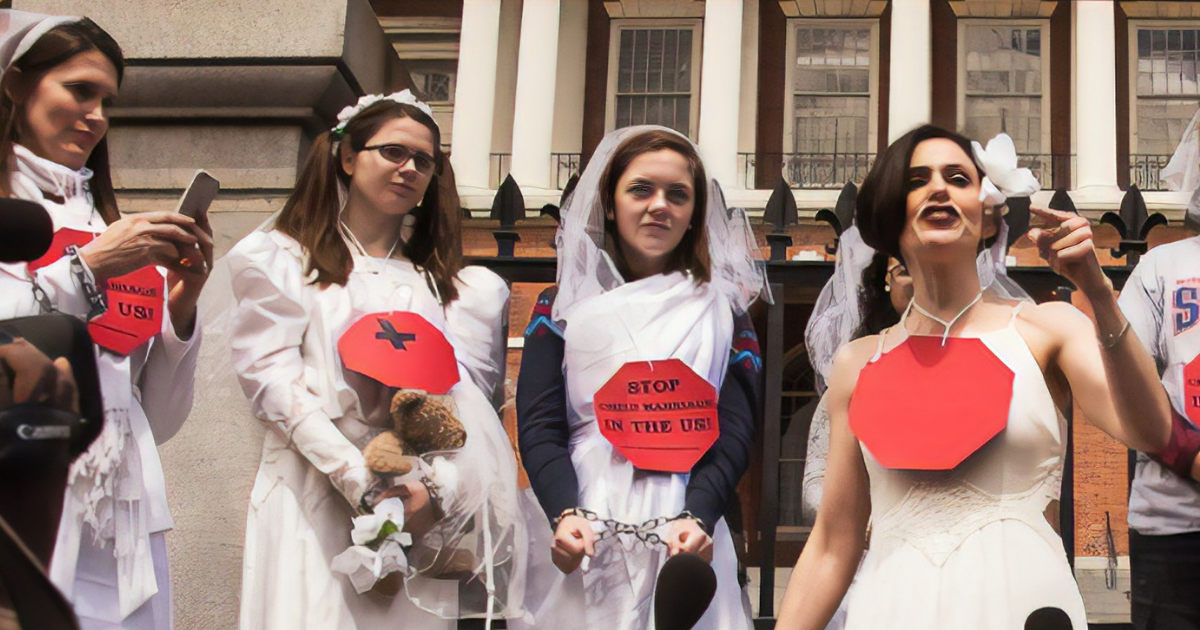
Ending Child Marriage in the U.S.
By GO HumanityThe U.S isn’t the first country that comes to mind when one considers married children, but New York and Rhode Island just became the mere fifth and sixth states to ban the practice outright. (Following New Jersey, Delaware, Pennsylvania and Minnesota.)
The marriage age is set by each state and territory, either by statute or common law. An individual can marry without parental consent or other authorization upon reaching 18 years of age.
But in most states the consent of parents or legal guardians overrides the law. Parents can let their children make the adult decision to marry — and in some cases, the parent actually makes the decision for the minor to marry.
So at what age are children permitted to marry? Today in Massachusetts girls can marry at 12 and boys at 14. In Alaska and Vermont it’s 14 for both. 4 states have a minimum age of 15 years. In Mississippi it’s 15 for girls and 17 for boys. 22 states have a minimum age of 16 and 11 states have a minimum age of 17. 4 states have no official minimum age, but just require either parental consent and/or court approval.
Between 2000 and 2018, almost 300,000 children were married in the U.S. Around the world, 12 million girls under age 18 marry every year. The United Nations has set a goal of ending all child marriage by 2030, and activists are pushing for change.
New York and Rhode Island just passed new legislation against child marriage
On June 2, the New York State Assembly voted unanimously to approve a law ending marriage of people under 18 in New York. The previous law allowed children of 16 and 17 to marry with parental approval, and children of 14 and 15 to marry with permission from a judge and their parents.
Human Rights Watch, Unchained at Last, Tahirih Justice Center, Sanctuary for Families, and the National Organization for Women pressed New York lawmakers to pass the bill.
On June 7, Rhode Island also passed legislation to ban marriage under age 18. Prior to the law children as young as 16 could obtain marriage licenses with permission from a parent or guardian. Children younger than 16 could also get married if they held a family court hearing. Now 16 and 17 year olds are protected in Rhode Island.
New Jersey-based advocacy group, Unchained At Last, was instrumental in motivation of Rhode Island child advocates to encourage legislative intervention.
Several other states are introducing similar legislation.

Married minors face significant hardship
The vast majority of married teenagers are girls, and the cards are stacked against them. They are 50% less likely to finish high school and four times less likely to go to college. They have children at a young age and sometimes one after another, tearing their young bodies down. They are three times more likely to have five or more children.
Underage wives experience disproportionate rates of poverty and of domestic violence. They also face a higher risk of heart attack, cancer, diabetes and stroke, likely due to the stress of the situation. Significant associations have been found between child marriage and mental and physical health disorders.
Divorce rates are high and when teen mothers marry and later divorce, they (and their children) are more likely to end up in poverty than teen moms who remain single.
Minors don’t have the same rights as adults, even if they’re married to one. If they leave to escape abuse they could be returned by authorities as a runaway. Unaccompanied minors may be rejected from shelters. Minors often cannot retain an attorney. They can’t even file for divorce.
This creates a significant power imbalance between the minor and their adult spouse.

Laws permitting child marriage make a mockery of statutory rape laws
A study by Unchained At Last showed 60,000 marriages since 2000 occurred at an age or spousal age difference that should have been considered a sex crime.
18 U.S.C.§ 2243 calls for up to 15 years in prison and/or a fine for someone who has sex with a child age 12 to 15, if the child is at least four years younger but it specifically exempts those who first marry the child. This incentivizes child marriage and implicitly endorses the rape of children.
A marriage license should not be a “get out of jail free” card for a would-be rapist, but that’s what’s happening under state laws that allow to happen within marriage what would otherwise be considered statutory rape.
Laws permitting child marriage encourage forced marriage

The majority of underage girls getting married are 16 and 17, and typically they’re choosing to marrying men in their 20’s, but the most severe consequence of the gap in legislation is that it also allows girls to be forced into marriage.
Allowing parents to sign for a child means a parent can coerce or force a child to marry. Some apply for foreign men to come wed their young daughters, in some cases taking them out of the country. Forced marriage means rape.
As long as the law allows parents to sign for minors, children will be married against their will.
Activist group Unchained At Last describes testimonials of coercion into marriage of girls too young to consent to sex. They report that “even when a minor shows up sobbing at the clerk’s office while their parents force them to marry, the clerk is unwilling or unable to intervene.”
Four states’ laws still specifically allow pregnant girls to marry, a loophole that has been used to cover up rape and force girls to marry their rapist.
There is no reason a teenager needs to get married. Legislation allowing it largely benefits predators and exploits underage children.
Permitting child marriage encourages sex trafficking
Federal law practically enables child trafficking. Immigration law does not specify a minimum age to petition for a foreign spouse or fiancé(e) or to be the beneficiary of a spousal or fiancé(e) visa.
This allows American girls to be trafficked for their citizenship, and allows for children around the world to be trafficked to the U.S. under the guise of marriage.

Legislation is needed to end child marriage
The national number of children married decreases almost every year but is unlikely to get to zero without legislative intervention.
Every U.S. state, territory and district must pass legislation to eliminate any legal loophole that allows marriage before age 18 (or higher, in the three states where the age of adulthood is higher).
The federal government must set a minimum age of at least 18 to petition for a spousal or fiancé(e) visa or to be the beneficiary of such a visa.
In 2020, donors helped Foundation Beyond Belief Foundation Beyond give a quarterly grant to Unchained At Last, an organization founded in 2011 by a forced marriage survivor. Its mission is to provide free legal and social services helping people in the U.S. escape forced marriages.
Unchained At Last and its allies have formed a National Coalition to End Child Marriage. They work with state and federal legislators on policy solutions and raise awareness of child marriage in the U.S.
Currently, they are engaged in dramatic visibility campaigns, writing campaigns, and more to persuade New York Governor Cuomo to sign the Legislature’s bill against child marriage.
We encourage our followers to subscribe to Unchained at Last’s email list or check news on their website, and follow them on social media for ways they can be part of the effort.

Bride photos: Unchained at Last

